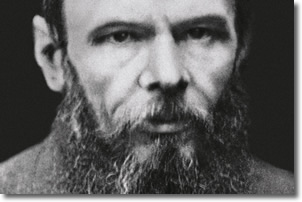Rad note » this entry originated from another page. It was moved here because the subject drifted far enough to warrant its own, separate page, which lets me focus on and reference more easily the concepts under discussion here.
At the end of this entry (that you're reading now) I have included a link that will return you to the exact place from where this entry originated. Here ya go ...
Joseph Frank is About the » Socio-Political & Ideological Context of Dostoevsky's Novels
Tho it is somewhat ironic that I am mentioning Dostoevsky's (remarkable) personal history (» political arrest by the czar, his mock execution and years spent in a hellish Siberian concentration camp with common peasant criminals) .. especially now ..
 .. because this is precisely the thing that Joseph Frank says that most people make too big of a deal out of ..
.. because this is precisely the thing that Joseph Frank says that most people make too big of a deal out of ..
.. while ignoring the really important stuff.
He says, if you really wanna understand Dostoevsky and especially his novels ..
.. you really need to understand the socio-political and ideological context of the day ..
.. because that is what Dostoevsky's novels were all about. They were often a response to the prevailing ideas of the established Russian intelligensia of his day. ( "Dear Fuck-Heads of the so-called Intelligentsia..." )
Joseph Frank does not say that Dostoevsky's mock execution and his time spent LIVING WITH common peasant criminals in a Siberian prison camp werent influential.
Rather he is saying that his novels are not about that .. so dont focus all your attention there .. even while admitting that Dostoevsky's personal history is indeed fascinating.
<ignore this intentional body-text marker>
••• today's entry continues here below •••
His approach brings alive Dostoevsky's stories in a way not grasped for before (.. for me anyway). He paints a picture of Dostoevsky single-handedly taking on the radical young thinkers of his day and putting them in their place. The sparks that fly from the clash of ideas is always illuminating and dramatic.
The illuminating quality of Joseph Frank's writing was such that it actually reminds me of Walter and of Joseph Stiglitz. They cast such a clear, bright light on their respective subjects.
Dostoevsky's approach to showing the Russian intelligensia the error of their ways seems similar to the philosophical technique of » Reductio ad absurdum .. in that he (Dostoevsky) takes their (the Russian intelligensia) ideas and runs them all the way out .. until you see the end thereof.
Anselm adopts a similar technique in his famous Ontological Argument for the Existence of God .. where he starts by noting that there are only two options (God either exists in reality or he doesnt) and then by adopting the premise of the unbeliever and then showing how that premise ends in absurity.
Joseph Frank's single-volume bio is divided into 5 parts, which each part corresponding to one of the books from his 5-volume original. They are some very cool titles .. see if you agree.
 Number-of-years covered by each of the five parts » 30 » 10 » 5 » 5 » 10 [ 1821 - 1881 ]
Number-of-years covered by each of the five parts » 30 » 10 » 5 » 5 » 10 [ 1821 - 1881 ]
- The Seeds of Revolt (spans his first ~30 years)
- The Years of Ordeal (10 years in Siberia, 4 of them in a hard-labor camp with peasant criminals & the last 6 in forced military service which he hated)
- The Stir of Liberation (his first 5 years after getting released, Notes from Underground)
- The Miraculous Years (his next 5 years after getting released, a period which covers both Crime & Punishment and The Idiot. This period also happens to be when Tolstoy was writing & publishing Anna.
- The Mantle of the Prophet (his last 10 years, which includes both Demons & The Brothers)
Joseph Frank uses the 1825 poem by Pushkin (1799-1837) titled » The Prophet as his introductory tone-setter to lead off his single-volume bio.
Pushkin was supposedly inspired to write this poem by » this section of scripture from Isaiah .. which I had alluded to myself .. in this entry here (January of last year).
Tho my use plays off an artist becoming the voice-of-his-generation and the challenges surely associated with such a job.
This honor seems a distinction that must be freely given by fans, and cannot be conquered by the artist. Tho I could be wrong. Perhaps you could say that the artist 'earns' the distinction .. by giving-voice-to .. their fans.
This is not my area of expertise, so I wield little intuitive insight here.
Intuitively I feel that the artist gives voice to the cries of his own heart .. and that the enchantment begins when he own cries resonate with others.
I thought of this when I saw where Pushkin got his inspiration. I found myself wondering what were the similarities and the differences between a voice-of-his-generation and a prophet. (These are probably slippery things to define.)
But with the title of Frank's final volume, which includes the word 'prophet' .. that will likely give me an opportunity to discuss that topic. Which could be fun. Toss a few thunderbolts and see where they land.
You can return to the exact spot from where this entry originated .. see » here.
<ignore this intentional bottom text spacer, too>
